#Nobel Prize winners list
Explore tagged Tumblr posts
Text
Nobel Prize Winners in India
Nobel Prize is a prestigious award that is given in six fields, chemistry, physiology or medicine, literature, physics, economic sciences and peace. It was founded by Alfred Nobel, who was a Swedish chemist, engineer and industrialist. Henri Dunant of Switzerland and Frederic Passy of France were the first recipients of the Nobel Prize in 1901. The first Indian to receive the Nobel Prize was Rabindranath Tagore in 1913. After him, many Indians have won this Prize in different fields, here is the list of Indian Nobel Prize Winners.
1. Rabindranath Tagore
2. C.V Raman
3. Har Gobind Khorana
4. Subrahmanyan Chandrasekhar
5. Venkatraman Ramakrishnan
6. Kailash Satyarthi
7. Abhijit Banerjee
The above list demonstrates the capability of Indian brains and their potential to make meaningful changes on a global scale. However, note that many exceptional Indians, such as Dr Narinder Singh Kapany, did not get the recognition they deserved for various reasons. Still, their contribution made a mark on the world, advancing knowledge and shaping industries. So, feel proud and try to make a difference in the field that you are most interested in and want to work in the future. Your work and dedication will be India’s pride and achievement.
#ndian Nobel Prize winners#Nobel Prize winners list#Nobel Prize achievements#Indian contributions to Nobel#Rabindranath Tagore Nobel Prize#C.V. Raman Nobel Prize#Har Gobind Khorana Nobel Prize#Nobel laureates India#Indian Nobel Prize winners history#Nobel Peace Prize India#Indian scientists Nobel Prize#Abhijit Banerjee Nobel Prize#Venkatraman Ramakrishnan Nobel Prize#Kailash Satyarthi Nobel Prize#best cbse school in nalagarh#education#school
0 notes
Text
Writers from around the globe including Lee Child (creator of Jack Reacher), Bernard Henri-Lévy (Philosopher and Author), Herta Müller (Author, Poet, and Nobel Prize Award Winner), Sir Simon Schama (Historian and Author), Howard Jacobson (Booker Prize-winning Author), Simon Sebag Montefiore (Historian and Author), Adam Gopnik (Writer), Yossi Klein Halevi (Author), David Mamet (Author & Pulitzer Prize Winner), Elfriede Jelinek (Author and Nobel Prize Award Winner), join entertainment leaders, Mayim Bialik, Debra Messing, Julianna Margulies, Scooter Braun, Haim Saban, Ynon Kreiz, Ozzy Osbourne, and Gene Simmons amongst many others, to reject boycotts against authors and literary institutions.
LOS ANGELES (October 30, 2024) — More than 1000 leaders from the literary and entertainment industry signed an open letter released by the non-profit entertainment industry organization Creative Community For Peace (CCFP) in support of freedom of expression and against discriminatory boycotts.
The letter comes in response to continued efforts to boycott, harass, and scapegoat Jewish and Israeli authors and literary institutions. Among the signatories are Nobel laureates, Pulitzer Prize winners, and Booker Prize winners.
Booker Prize-winning author, Howard Jacobson said: “Art is the antithesis to a political party. It is a meeting place not an echo chamber. Art explores, discovers, differs, questions and surprises. Precisely where a door should be forever open, the boycotters slam it closed.”
Recent calls to boycott Israeli literary institutions follow a year filled with efforts to demonize and ostracize Jewish authors across the globe. In the last year, bookstore appearances have been canceled based on authors’ identities and book readings have been shut down. Activists have publicized lists of “Zionist” authors to harass and just last week, ads for a book with ‘Israel’ in the title were rejected.
Author of the Jack Reacher novel series, Lee Child said: “Politically targeting novelists, authors, and publishing houses based on their nationality is misguided. At a time when dialogue is paramount and when compromise can lead to peace, castigation and blanket boycotts are counterproductive. The written word, and the dissemination of it, must always be protected, especially in times of heightened tension. And to achieve peace, we must humanize one another and build bridges across communities through the open exchange of ideas. Literature allows for that. Boycotts hinder it.”
The letter highlights the unique role that writers and books play in society, “We believe that writers, authors, and books — along with the festivals that showcase them — bring people together, transcend boundaries, broaden awareness, open dialogue, and can affect positive change.” It continues, “We believe that anyone who works to subvert this spirit merely adds yet another roadblock to freedom, justice, equality, and peace that we all desperately desire.”
Actress and Author Mayim Bialik said, “Harassing authors, canceling bookstore appearances, and boycotting people based solely on their identity is disturbing and polarizing in ways that cannot be dismissed or minimized. Attempts to dictate “who” or “what” should be published have nothing to do with any path to coexistence or peace. This kind of rhetoric encourages demonization and hatred. As an author and as a creative, I believe in peace, I believe in humanity, and I believe in meaningful discourse. Silencing and sowing discord in this way reduces complex individuals to oversimplified caricatures which only hardens existing hostility and makes the hope for peace inch farther away.”
Philosopher and Author Bernard-Henri Lévy said: “I have always believed in the power of ideas and truth. I have always been in favor of debate, clash of opinions, even the confrontation of convictions. But what we have here is not a clash of opinions or a debate. Boycotting Israeli writers, publishers and festivals is pure anti-Semitism – and it’s anti-democratic and dangerous. The goal of this boycott is the delegitimization of the only Jewish state in the world—Israel. It is a moral obscenity and must be firmly condemned by all free-thinking and democratic citizens of the world.”
Author and historian Simon Sebag Montefiore said: “The resort to witch hunt is always dangerous and ugly especially when the inquisitors are writers. History is full of examples of self-righteous cadres of self-appointed judges who tried to enforce their version of purity by excluding people. Whatever one thinks of this tragic Middle Eastern war, who judges who is good, who bad? Once started where would it stop? Who is pure enough?”
The statement is the first of its kind – a call from the literature and entertainment community to unequivocally voice support against boycott attempts based on identity or litmus test.
The letter states: “Regardless of one’s views on the current conflict, boycotts of creatives and creative institutions simply create more divisiveness and foment further hatred.” The letter concludes: “We call on our friends and colleagues worldwide to join us in expressing their support for Israeli and Jewish publishers, authors, and all book festivals, publishers, and literary agencies that refuse to capitulate to censorship based on identity or litmus tests.”
CCFP Executive Director Ari Ingel said, “Authors, writers, and literary groups have faced non-stop harassment by a dedicated group of illiberal activists since October 7th. This is not just about Israeli authors. This is a coordinated campaign to bully and threaten anyone who refuses to condemn Israel, which targets Jews and their allies worldwide. These boycott calls, now being led by members of the literary community themselves, are reminiscent of the 1933 boycott of Jewish authors, when antisemites burned over 25,000 books. The works of Jewish authors like Albert Einstein and Sigmund Freud, alongside American works by Ernest Hemingway and Helen Keller were burned. This is where things are once again headed.”
Signatories Include:
Howard Jacobson, Booker Prize-winning Author; Lee Child, Author; Mayim Bialik, Actress & Author; Dr. Simon Sebag Montefiore, Historian and Author; Bernard-Henri Lévy, Philosopher and Author; Sir Simon Schama, Historian and Author; Yossi Klein Halevi, Author; Elfriede Jelinek, Playwright, Author and Nobel Prize Award Winner; David Mamet, Author & Pulitzer Prize Winner; Ozzy Osbourne, Artist and Author; Sharon Osbourne, Author, Manager, TV Personality; Herta Müller, Author and Nobel Prize Winner; Dara Horn, Author; Debra Messing, Actress, Gene Simmons, Author & Artist; Julianna Margulies; Actress; Jerry O’Connell, Actor; Douglas Murray, Author; Scooter Braun, Founder/CEO, Hybe America, Ynon Kreiz, Chairman and CEO, Mattel, Inc.; Haim Saban, Chairman and CEO, Saban Capital Group; Aaron Bay-Schuck, CEO/Co-Chairman Warner Records; Sherry Lansing, Former CEO of Paramount Pictures; Rick Rosen, Co-Founder, Endeavor; Jenji Kohan, Writer/Producer; Adam Gopnik, Writer; Deborah Harris, The Deborah Harris Agency; Diane Warren, Songwriter; Anders Rydell, Author; Ilya Kaminsky, Author and Poet; Elisa Albert, Author; Aayan Hirsi Ali, Author; Lionel Shriver, Author; Noreena Hertz Author; Sir Niall Ferguson Milbank Family Senior Fellow at the Hoover Institution and Author; Rebecca De Mornay, Actress; Jennifer Jason Leigh, Actress; Amy Sherman-Palladino, Writer and Producer; Matti Friedman, Author; Neil Blair, Partner, The Blair Partnership; Anthony Julius, Attorney and Author; Gail Simmons, Author; Ben Silverman; Chairman & Co-CEO, Propagate Content; Bret Stephens, Pulitzer Prize Winner; Fernando Szew, President, Fox Entertainment; amongst many others.
54 notes
·
View notes
Text
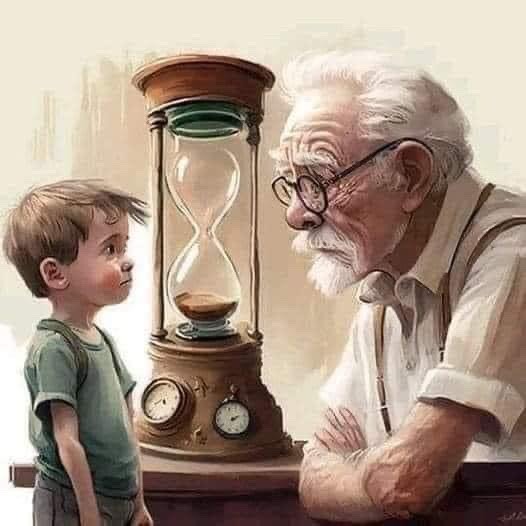
Possibly the Most important thing you'll read this Year...
The following is the philosophy of Charles Schulz, the creator of the 'Peanuts' comic strip.
You don't have to actually answer the questions. Just ponder on them. Just read it straight through, and you'll get the point.
1. Name the five wealthiest people in the world.
2. Name the last five Heisman trophy winners.
3. Name the last five winners of the Miss America pageant.
4. Name ten people who have won the Nobel or Pulitzer Prize.
5. Name the last half dozen Academy Award winners for best actor and actress.
6. Name the last decade's worth of World Series winners.
How did you do?
The point is, none of us remember the headliners of yesterday. These are no second-rate achievers. They are the best in their fields.
But the applause dies.
Awards tarnish.
Achievements are forgotten.
Accolades and certificates are buried with their owners.
Here's another quiz. See how you do on this one:
1. List a few teachers who aided your journey through school.
2. Name three friends who have helped you through a difficult time.
3. Name five people who have taught you something worthwhile.
4. Think of a few people who have made you feel appreciated and special.
5. Think of five people you enjoy spending time with.
Easier?
The lesson:
The people who make a difference in your life are not the ones with the most credentials, the most money ... or the most awards. They simply are the ones who care the most.
Source: Weird and Amazing Stuff
226 notes
·
View notes
Text
6thofapril1917's Eastern Front Reading List
So, you're an HBO War fan who wants to learn more about the Eastern Front. Maybe you, like me, wanted to know why Masters of the Air's depiction of the Nazis was so much darker than in Band of Brothers. Below is a list of books on the topic that I've been assigned during my time studying Eastern European and Soviet History. Most of these are scholarly monographs, not pop history, but I found them gripping regardless. I've provided Internet Archive links when available, and links to booksellers when not. If anyone else has suggestions, feel free to add them in reblogs - I focus primarily on Russia, Belarus, and Ukraine.
The Eastern Front, 1941-1945, German Troops and the Barbarisation of Warfare; 2nd edition by Omer Bartov (Palgrave Macmillan, 2001). Available on Internet Archive.
Originally published in 1985. The first book in English to comprehensively challenge the Clean Wehrmacht myth. Examines the experiences, indoctrination, and crimes of Wehrmacht soldiers.
Ivan's War: Life and Death in the Red Army, 1939-1945 by Catherine Merridale (Picador, 2007).
Looks into the day-to-day life and experiences of soldiers in the Red Army. Probably the most accessible of the books on this list in terms of writing style.
A Writer at War: A Soviet Journalist with the Red Army, 1941-1945 by Vasily Grossman, trans. Anthony Beevor and Luba Vinogradova (Pantheon, 2007).
A collection of primary sources and writings from Soviet journalist Vasily Grossman, who was embedded with the Red Army.
Russia at War, 1941-1945: A History by Alexander Werth (Barrie & Rockliff, 1964).
Similar to Grossman, Werth was a British journalist for the BBC and the Sunday Times during the war. Details his experiences while embedded with the Red Army.
The Unwomanly Face of War by Svetlana Alexievich, trans. Richard Pevear and Larissa Volkhonsky (Random House, 2017).
Originally published in the USSR in 1983. Nobel Prize winner Alexievich's Groundbreaking oral history of women who served in the Red Army during the Great Patriotic War. One of my personal favorites.
Last Witnesses: an Oral History of the Children of World War II by Svetlana Alexievich, trans. Pevear and Volkhonsky (Random House, 2019).
Originally published in the USSR in 1985. Covers the experiences of Soviet children on the Eastern Front, soldier, partisan, and civilian alike.
Marching into Darkness: The Wehrmacht and the Holocaust in Belarus by Waitman Wade Beorn (Harvard University Press, 2014).
Examines the Wehrmacht and its crucial role in carrying out the Holocaust in Belarus.
Fortress Dark and Stern: The Soviet Home Front during World War II by Wendy Z. Goldman and Donald Filtzer (Oxford University Press, 2021).
Comprehensive overview of the Soviet home front over the course of the war, including the mass evacuations of people and industry into Siberia and Central Asia. An absolutely fascinating read.
The Myth of the Eastern Front: The Nazi-Soviet War in American Popular Culture by Ronald Smelser and Edward J. Davies II (Cambridge University Press, 2008). Available on Internet Archive.
Analyzes the creation of the Clean Wehrmacht myth by German war veterans, the myth's popularization in American culture, and its impact on Americans' understanding of the Eastern Front. Spoiler: Band of Brothers does not come out of this unscathed.
54 notes
·
View notes
Text
Bombshell by Clint Eastwood 👇
Clint Eastwood’s Stark Warning: “Barack Obama Presidency – The Biggest Fraud on the American People”
Clint Eastwood exposes the Barack Obama presidency as ‘the biggest fraud on the American people.’ Dive deep into the controversies, scandals, and secrets behind Obama’s legacy, from the Benghazi scandal to the SEAL Team 6 tragedy. Uncover the truth now!
Legendary actor and filmmaker Clint Eastwood boldly claimed:
“One day we will realize that the Barack Obama presidency was the biggest FRAUD ever perpetrated on the American people.”
Eastwood, known for his fearless critique of Hollywood and politics alike, pulls no punches in his assessment of Obama’s tenure. Eastwood’s statement brings fresh scrutiny to a presidency that was celebrated by many yet criticized for its scandals and failings. Let’s dive deeper into the unfolding story.
Clint Eastwood: A Fearless Voice in a Hollywood of Silence
Eastwood’s words matter. This is not just another Hollywood actor parroting opinions. He stands apart from the Hollywood echo chamber, a space where most actors are afraid to speak out against the political mainstream. Eastwood’s condemnation of Obama comes at a time when the Obama administration is still debated fiercely.
Barack Obama: Nobel Peace Prize Winner with a Kill List
Obama’s controversial actions tell a different story. The Obama administration was marked by military interventions and controversial drone strikes that led to civilian casualties. Critics mention Obama’s “kill list” – a classified list of individuals targeted for drone strikes without trial.
The narrative of peace clashes with extrajudicial killings. The drone program under Obama raises serious questions about human rights and the ethical implications. Was Obama’s portrayal as a peaceful leader nothing but a crafted illusion?
SEAL Team 6: The Tragic Story and Unanswered Questions
One of the most gut-wrenching events is the suspicious fate of SEAL Team 6 in 2011. Conspiracies have surrounded this incident, suggesting the team was set up or used as political pawns.
Was this merely an unfortunate accident, or does it point to sinister dealings within the Obama administration? Critics argue that the truth about SEAL Team 6 has been hidden, and call for accountability and criminal prosecution, placing Obama’s role under intense scrutiny.
The Benghazi Scandal: The Truth Behind the Treason
One of the most haunting legacies of the Obama presidency is Benghazi. An attack on the U.S. consulate in 2012 left four Americans dead, spiraling into a political firestorm. Allegations of negligence, cover-up, and treason were leveled against both Obama and Hillary Clinton.
The Obama administration’s mishandling of Benghazi endangered American lives and demonstrated a betrayal of trust. The symbol of treachery still lingers over the Obama-Clinton era.
Obama’s Legacy: A Tarnished Record or Unfairly Targeted?
Eight years of the Obama presidency left behind a polarizing legacy. To some, he was a beacon of hope; to others, a symbol of failed policies. Eastwood’s scathing critique calls into question whether the rosy image of Obama is based on reality or political spin.
Issues like the Iran nuclear deal, mishandling of Syria, and IRS targeting of conservatives add more fuel. Hero or fraud? Visionary leader or master of deception?
Why the Truth Matters
Eastwood’s statement is a call for accountability. It's urging us to look beyond the polished speeches and uncover the truth about Obama. From the SEAL Team 6 incident to the Benghazi drama, the Obama administration's alleged misdeeds left a mark that can’t be ignored. This is about truth, justice, and the trust between a nation and its leader. 🤔
#pay attention#educate yourselves#educate yourself#knowledge is power#reeducate yourselves#reeducate yourself#think about it#think for yourselves#think for yourself#do your homework#do your own research#do some research#do your research#ask yourself questions#question everything#clint eastwood#wake up#hidden history#lies exposed#truth be told#ncswic
63 notes
·
View notes
Text

hilzfuld
Unbelievable! No, seriously! I can’t believe this!!! This week, biochemist David Baker and physicist Gary Rubcon were added to the grand list of Jewish Nobel Prize winners. Or as the Jews like to call it - just another normal week 😉 The number of Jewish nobel winners now stands at 217 out of 992 Nobel Prize winners. Which means, 22% out of all the nobel winners, when the global Jewish population still stands at 0.2%!!! Just let that sink in for a moment. Different cultures from the dawn of time till this day will continue to be hell-bent on focusing to try and get rid of us for simply being Jewish. But we will continue to choose life and will continue to flourish! The Jewish people defy logic over and over! You’re welcome, world. Thanks @libman2020 for sending this info!!
48 notes
·
View notes
Text
Lame-duck periods are meant to be inconsequential, but on Thursday afternoon at the White House, U.S. President Joe Biden got a chance to present one of the most important breakthroughs of his time in office. In what was the largest U.S.-Russia prisoner swap since the Cold War, involving at least seven countries over a period of months, a total of 24 people moved across borders as pawns in a game of global 3D chess.
Eight Russians are returning home in exchange for a combination of 16 Americans, Germans, and Russians. Within an hour of confirmation that U.S. prisoners were safely out of Russia, Biden assembled family members of the freed Americans at the White House and addressed a gathering of journalists. As he looked into the cameras, he no doubt knew that he was being closely watched by his counterparts in Beijing and Moscow, by millions of people around the world, and by history.
Even in his moment of triumph, Biden found a way to focus on the human reality of the moment. He singled out Miriam, the daughter of the released Russian American journalist Alsu Kurmasheva. It was one day until her 13th birthday, and Biden put an arm around Miriam, leading a chorus of the world’s most popular song. The joy was obviously precipitated by a major international development, but it was also the day a teenage girl would see her mother again after more than nine months in prison, convicted for the crime of writing about Russia’s army.
There’s a long list of prominent names involved in Thursday’s prisoner swap, including Evan Gershkovich, the Wall Street Journal reporter sentenced to 16 years in prison under false claims of conducting espionage, and Paul Whelan, a former U.S. Marine who was in Russia for a friend’s wedding and accused, again, of espionage. There were German citizens and even Russians, including Oleg Orlov, a human rights defender and co-chair of the Nobel Peace Prize-winning group Memorial, in prison for speaking his mind about his country’s war in Ukraine.
Journalists, tourists, and activists went one way in the prisoner exchange; on the other side was Vadim Krasikov, a former colonel in Russia’s Federal Security Service serving a life sentence in a German prison for a hit on a former Chechen fighter, conducted in broad daylight in Berlin. Others included a Russian citizen involved in international money laundering, a hacker, a credit card fraudster, and an actual spy.
The historic exchange instantly evokes imagery from the Cold War, when such transfers of prisoners were more common. But rather than the historical parallels, it is the contrasts drawn by Thursday’s events that will be remembered. There was Washington, fighting for the freedom of not only its own citizens but also Russians who dared to criticize their own government, and in stark relief there was Moscow, openly trading journalists for criminals and Nobel winners for fraudsters. The Kremlin has gleefully applauded knocks to U.S. soft power, from the misadventure of the Iraq War to the botched U.S. departure from Afghanistan in 2021, but the symbolism of the moment will have not been lost on Russian President Vladimir Putin: This exchange isn’t a great look for him. And even though Biden’s claims of a grand battle between democracies and autocracies are often criticized for being too black and white for the modern multipolar world, the lame-duck president now has a moment to mark his favorite reference in the history books.
It’s an election year in the United States, so contrasts will also be drawn around the alternate visions of Washington’s role in the world—currently being debated by surrogates for the Democratic and Republican campaigns. Former U.S. President Donald Trump has long argued for a more transactional approach to geopolitics. In such a world, there are two players—one is a winner, the other a loser. The Trump worldview prioritizes singular might over alliances; values don’t matter as much as the value of the hand of cards a player is clutching to their chest. Biden, while careful to focus on the humanity and history of the moment, couldn’t resist pointing out the difference: “For anyone who questions whether allies matter, they do.” He was referring in particular to the role of Germany, which had reportedly been reluctant to give up Krasikov. Biden personally spoke with German Chancellor Olaf Scholz in January and February, arguing the importance of the prisoner exchange.
Speaking a short while later to reporters, U.S. National Security Advisor Jake Sullivan built on his boss’s message as he detailed the roles played by Germany, Turkey, and others in the prisoner swap. “There is no more powerful example of the importance and power of allies,” he said. “This was vintage Joe Biden.”
Supporters of presumptive Democratic presidential nominee Kamala Harris are also pointing out her role, visiting the Munich Security Conference a few times as vice president and building relations with German and European leaders.
Sen. J.D. Vance, the Republican vice presidential nominee, was quick to offer an alternative view: “We have to ask ourselves, why are they coming home? And I think it’s because bad guys all over the world recognize Donald Trump’s about to be back in office, so they’re cleaning house. That’s a good thing.”
And so the race for the White House rolls on, with both sides seeking to score points and spin their version of events. Thursday will be a historic study in contrasts—between Washington and Moscow and between rules and impunity. It will also be a moment that could play a part in an American referendum on Washington’s role in the world and whether the electorate favors the slow, painstaking diplomacy of Biden or the instant gratification and drama of Trump’s dealmaking.
66 notes
·
View notes
Note
this is not a req or anything but just a thought i’ve been having…..u know how the wags have their profession listed under their names when the camera pans to them? i think it would be so funny and also cute if someone had a very very smart gf and was basically just the himbo racing bf 😭 kinda like lily and alex albon. the idea of “yn yln, nuclear physicist and lando’s partner” is sooooo funny to me like lando does not know what that is. or “harvard professor and max’s partner” max doesn’t even READ!!!
“nasa engineer and lewis’ partner” u know lewis’ space nerd ass was posted up outside her lab everyday asking for a tour. he’s not slick 😐 he keeps her up at night asking about space.
WAITTTTT THIS IS SO CUTE OMG :((((
y/n yln, pulitzer prize winner for fiction and some guy who races. y/n yln, youngest delegate at the un and some dude. yn yln, marine biologist and nobel prize winner and … oscar? whoever that is.
that’s so cute wait. i need more professions. this is so cute. lewis is always like … so can u give me a tour 🤩 and yn is like of nasa??? who do u think i am??? i’m just an engineer not the president.
47 notes
·
View notes
Text

The following is the philosophy of Charles Schulz, the creator of the 'Peanuts' comic strip. You don't have to actually answer the questions. Just ponder on them. Just read it straight through, and you'll get the point.
I. Name the five wealthiest people in the world. II. Name the last five Heisman trophy winners. III. Name the last five winners of the Miss America pageant. IV. Name ten people who have won the Nobel or Pulitzer Prize. V. Name the last half dozen Academy Award winners for best actor and actress. VI. Name the last decade's worth of World Series winners.
How did you do? The point is, none of us remember the headliners of yesterday. These are no second-rate achievers. They are the best in their fields. But the applause dies. Awards tarnish… Achievements are forgotten. Accolades and certificates are buried with their owners.
Here's another quiz. See how you do on this one: I. List a few teachers who aided your journey through school. II. Name three friends who have helped you through a difficult time. III. Name five people who have taught you something worthwhile. IV. Think of a few people who have made you feel appreciated and special. V. Think of five people you enjoy spending time with.
Easier?
The lesson: The people who make a difference in your life are not the ones with the most credentials, the most money or the most awards. They simply are the ones who care the most.
27 notes
·
View notes
Text
Possibly the Most important thing you'll read this Year...
The following is the philosophy of Charles Schulz, the creator of the 'Peanuts' comic strip.
You don't have to actually answer the questions. Just ponder on them. Just read it straight through, and you'll get the point.
1. Name the five wealthiest people in the world.
2. Name the last five Heisman trophy winners.
3. Name the last five winners of the Miss America pageant.
4. Name ten people who have won the Nobel or Pulitzer Prize.
5. Name the last half dozen Academy Award winners for best actor and actress.
6. Name the last decade's worth of World Series winners.
How did you do?
The point is, none of us remember the headliners of yesterday.
These are no second-rate achievers.
They are the best in their fields.
But the applause dies.
Awards tarnish ...
Achievements are forgotten.
Accolades and certificates are buried with their owners.
Here's another quiz. See how you do on this one:
1. List a few teachers who aided your journey through school.
2. Name three friends who have helped you through a difficult time.
3. Name five people who have taught you something worthwhile.
4. Think of a few people who have made you feel appreciated and special.
5. Think of five people you enjoy spending time with.
Easier?
The lesson:
The people who make a difference in your life are not the ones with the most credentials, the most money ... or the most awards. They simply are the ones who care the most
-Amanda Rahele Root
A grand lesson to carry with you through the day. Hail Thyself, Lady Amanda. 💙💜💗
#self love#self care#self esteem#life advice#charles m schulz#living truth#love#lgbtq#amanda rahele root#hail thyself
33 notes
·
View notes
Text
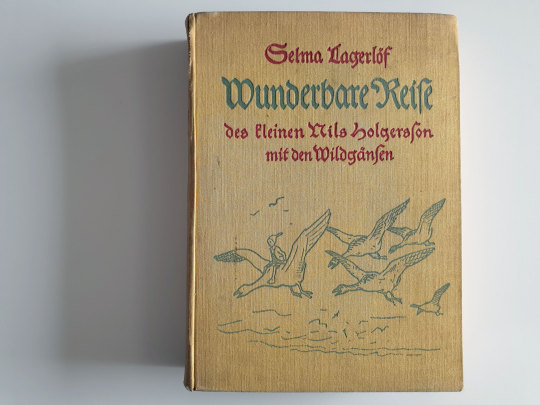
Book-Blog Intermission:
Wonderful Journeys through Time and Literature with Nils Holgerson
Like most of my generation I grew up with the 1980 anime series. And, as I'll say at every opportunity, it spoiled me for pretty much any other TV-show. A good series should follow a literary original - and quite closely. It should have gorgeous aesthetics and music. A plot centered around adventure, history, tradition, loyalty and faith. Plot-decisions should never follow external factors like availability of actors or stale marketing formulas. And it should end when the story is told out.
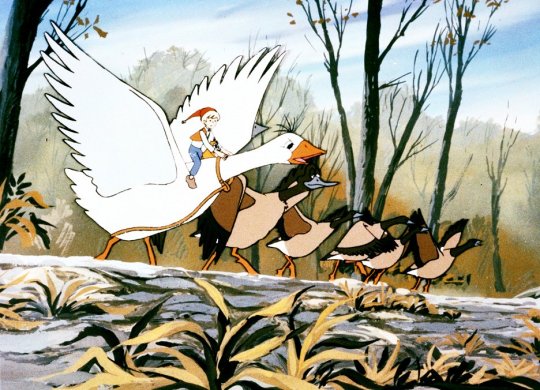
My mother had the mad idea to try and read the book to me when I was about 5. I didn't understand a word of it. She had a very boring copy too, without any pictures.
Aged 25 I bought the cute edition on the right and made it a reading-project. After each chapter I watched the corresponding episode of the series. And I repeat: It shows the quality of the series that you can do this. Still is was super interesting to note everything they changed. Some things only made sense to me then. Like the story of the parade towards to icy mountain. As a child it just impressed me with its scariness. But in fact it's a parable of which plants can grow how far north.
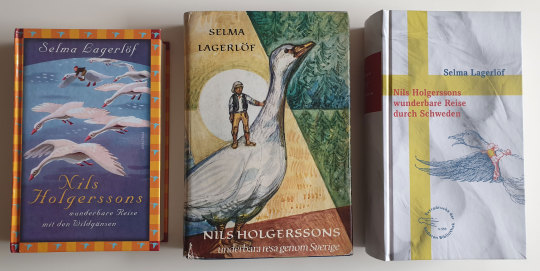
Cute as it is, the left edition was so badly translated that I went ahead and learned Swedish to read it in the original (middle). In the meantime the German book-market also spoiled me with an up-to-date state-of-the-art unabridged translation (right). So I don't even need to use a dictionary :)
There is one other edition in the house and that's my grandmother's school-copy. As it is well know, Nils Holgerson was written as a reader for Swedish schools, covering geography, history and natural history of Sweden. Since it is an absolute masterpiece, it soon became a school-reader in many other European countries too.
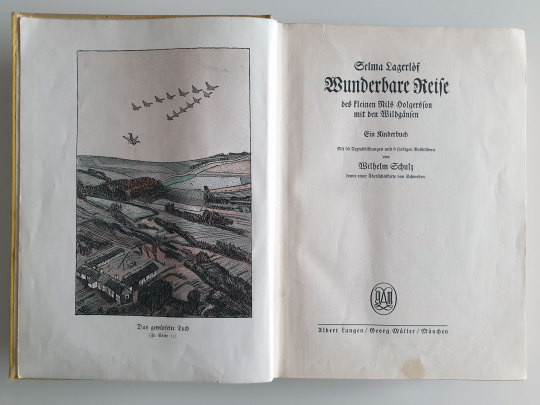
Especially Germany in the 1930s had a fatal obsession with all things Nordic. So every school-child had to learn all about Swedish castles too. I always wondered why nobody at least tried to write a rip-off set in Germany. Only recently, in the course of my current research, I found out that someone did. Tamara Ramsay: Wunderbare Fahrten und Abenteuer der kleinen Dott (images not mine). But it only came out in 1941 and never made it to school-reader status.
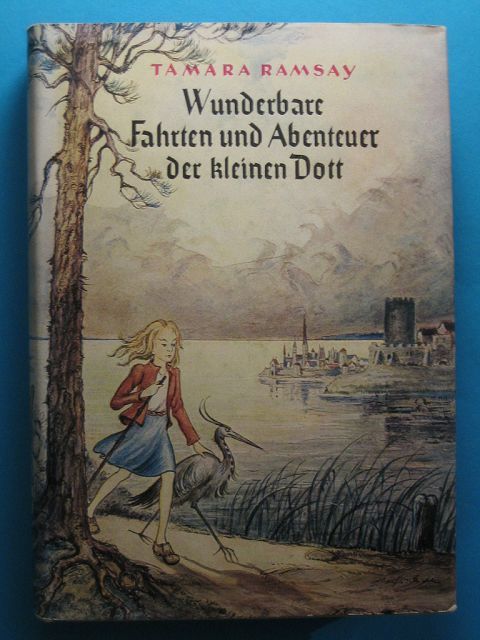
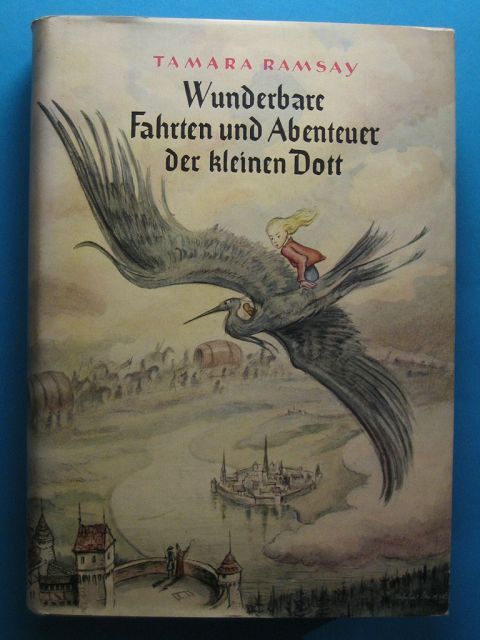
My grandmother and her class enjoyed Nils Holgerson so much, they wrote collective fan-mail to Selma Lagerlöff. She replied too. She wrote that she got her German translator to decipher their letter and that she was very glad they enjoyed her book. The translator must have been the same Pauline Klaiber-Gottschau who first translated the book into German.
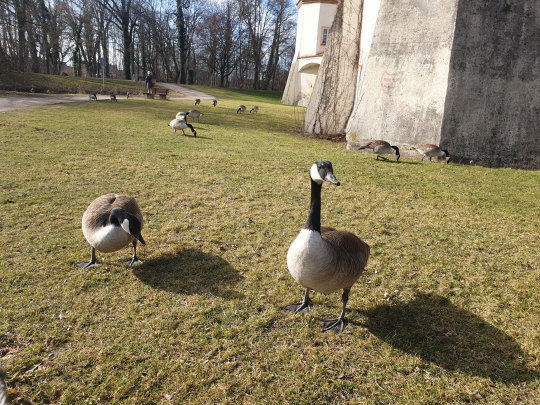
The original wild geese can of course be consulted at the International Youth Library in Munich. The building (Schloss Blutenburg) is the cutest little medieval castle that's been forgotten on the edge of the city. And in winter and spring you can meet the geese spending the winter in the moat. As a child I always regretted that Nils Holgerson ends just as the geese plan to cross to Germany. I'd have loved to see their Schloss Blutenburg adventure!
My Grandmother also appears to have read most other books by Selma Lagerlöff. At least she ticked them off in the list in her copy of Nils Holgerson. The only other one to survive in her collection is Gösta Berling (here in blue).
While the dated German bothered me a lot in Nils Holgerson, I deeply enjoy reading other Lagerlöff novels in as old editions as I can get hold of (here the much-mended red Gösta Berling). In old German print they just feel like they came from the dawn of time!
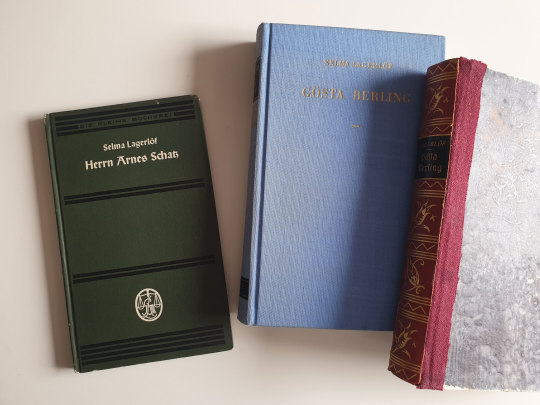
Those two have actually both been major inspirations for the McCarrics. Gösta Berling includes more or less the model for Fergus' dying-scene (if you ever want to see the subject treated by a nobel-prize-winner). And Herrn Arnes Schatz (Herr Arnes penningar) has the ghostly sister as well as badass Scotsmen (here unfortunately as the bad guys).
22 notes
·
View notes
Note
After Nwjns terminated their contracts I keep coming back to this post you made about wanting them to leave Hybe
https://www.tumblr.com/beautifulpersonpeach/750490456098537472/youre-probably-tired-of-this-topic-but-do-you?source=share
I'm not a bunnie but I wish nothing but good things for those girls.
***
Your link.
NewJeans are in the worst possible scenario right now and for people who love them, I hope the fact so many people are rooting for the girls provides a modicum of comfort.
Regardless of the outcome of their legal battles with HYBE, NewJeans has already made their mark on 2024.
Two examples:
They've been listed for their efforts in exposing the corrupt underbelly of the k-pop industry and standing up to the largest k-pop company. They are on this list alongside the first Asian woman and the first Korean winner of the Nobel prize in literature (Han Kang), in an article about remarkable Korean women who shined in 2024. Other people mentioned in the list include: Ahn Seyoung and Kim Joohye.
NewJeans is the only k-pop group with a spotlight in the New York Times list of the best music released in 2024. With this blurb highlighting Supernatural: "Why anyone would want to get in the way of the most stylistically impressive K-pop group of the past few years making tremendous, nostalgically precise and modernly sophisticated songs like this one is beyond me."
In 2025 the group might cease to be known as NewJeans, but as long as all five girls are able to secure their freedom, that's alright. I wish them nothing but the best.
10 notes
·
View notes
Text
On the outskirts of Oslo, just beyond the point where the city dissolves into forest, one thousand spruce saplings reach feathery green fingers toward the sky. Just over ten years ago this clearing was just another part of Norway’s vast woodlands. Today these trees are destined to become part of a unique library of texts by beloved authors, a century in the making.

Top: A crowd assembles for Valeria Luiselli’s handover ceremony in a spruce forest in Oslo in 2024. Luiselli was the tenth author to contribute to the Future Library. Bottom: The Silent Room, situated on the top floor of a public library in Oslo, contains one hundred drawers built into the walls where the authors’ manuscripts are preserved. (Credit: Vilma Taubo, Einar Aslaksen)
The spruces were planted in 2014 as part of the Future Library, a one-hundred-year art project by Scottish artist Katie Paterson. Every year a different author is invited to write a new piece that will be held, secret and unread, until 2114, when all the works will be published using paper made from the spruces’ then-mature wood. The inspiration for the piece arrived for Paterson during a train journey when she had a sudden vision of trees whose rings held words. Though the particulars evolved, the original idea remains, she says, of “trees being books, books being trees, and libraries being forests in the making.”
At the first handover ceremony, during which inaugural contributor Margaret Atwood presented her manuscript among the saplings, the trees were so small that staff decorated them with red ribbons to prevent attendees from trampling them. Now the trees are gawky adolescents, their ribbons decorative rather than practical—a testament to the project’s first decade and time’s insistent trudge. The Future Library continues to inspire imagination and instill new ideas in writers and readers alike through its abiding belief in a future full of stories.
Some sixteen thousand pieces of wood from trees cut down to make space for the spruce saplings were incorporated into the Silent Room, a chapel-like venue that opened in 2022 in a public library in Oslo, where all one hundred texts will be entombed until 2114. The chamber was designed with longevity in mind, using ultra-simple construction methods and specialty lighting. It is also beautiful: warm, wooden, and womblike, big enough for a few people at a time to sit in shoeless contemplation, just a few feet from manuscripts they will never read.
The chair of the Future Library Trust, Anne Beate Hovind, helped spearhead construction of the Silent Room; she is also the original commissioner of the work, part of a public art initiative connected to the redevelopment of Oslo’s waterfront. Over the years, she has also identified land for the saplings, overseen their planting, and negotiated a century-long contract that ensures their protection and maintenance by municipal foresters. Thus far ten authors from across the globe, including 2024 Nobel Prize winner Han Kang and Zimbabwean novelist Tsitsi Dangarembga, have deposited manuscripts there. (This year’s contributor, Tommy Orange, will hand over his manuscript in the summer.) They are invited to do so and paid a flat fee, by a surprisingly small team—including Hovind, Paterson, and the leaders of the city library and three publishing houses. The goal is for the collection of works “to be read as a global project,” Hovind says, so the group works together to generate a long list of candidates, incorporating nominations from interested embassies and past contributors, before coming to a consensus.
For the Icelandic writer Sjòn, who goes by a mononym, the project represents an exquisite metaphor for literature itself—a tradition that binds human beings together across generations. Through literature, he says, “I can have a conversation with someone who has left traces of [themself] three thousand years ago in a poem,” and participating would allow him to engage similarly with future readers.
Still, he found deciding what to write almost impossibly daunting, as did 2022 contributor Judith Schalansky. She obsessed over her contribution, reading the requirements over and over—she even considered submitting hardcore textual pornography as a commentary on the immense possibilities of a no-questions-asked publishing guarantee. In the end, both she and Sjòn took inspiration from the way today’s century-old texts illuminate their era to shape their contributions.
Both authors also found the secrecy to be a particular challenge. “I realized how much I write for the present,” Schalansky says. Meanwhile Sjòn, who had previously believed he wrote solely for himself, was surprised to find the process deeply lonely without the possibility of feedback.
The project’s annual handover ceremonies have become important waypoints marking the library’s age and progress. Each ritual is unique and open to the public: Ocean Vuong’s featured chants by Buddhist monks; Karl Ove Knausgård’s, a recitation of an ancient Norwegian poem; Sjòn’s, a song performed by his wife, with harp accompaniment.
Afterward, walking among the spruces, Sjòn was keenly aware that he was following the same path, quite literally, as writers before and after him, shared custodians of a sacred, multi-millennial storytelling tradition. Much of the work of the Future Library engenders this kind of deep mutual trust across time, Hovind says, in the trustees who will come after her; in the longevity of the rituals and mechanisms she and Paterson have spent years putting into place; in the human beings who will receive the books in an unknown world. That means fighting the impulse to solve or predict every technological, societal, or ecological eventuality of the next ninety years. Paterson adds: “I think taking it decade by decade is all we can do.”
It will be up to future trustees to figure out how to make spruce trees into paper or where to print the books. And, Hovind wonders, what if the forest around the library saplings is developed? How will the trees fare as temperatures rise?
At the project’s start the climate crisis was looming, Paterson says, but its rapid intensification has changed how people engage with the library today. In 2014, she and Hovind were frequently asked if they thought there would still be books in one hundred years. Now in contrast, she observes, “It has turned to, ‘Will there be people?’” In the face of the doom and doubt of the contemporary zeitgeist, the project has become a source of optimism that contributing authors cite year after year, moved by its certainty that we can still build a literary future.
This hope is not without complexity—after all, the Silent Room was built with trees sacrificed to the cause, and more will fall in ninety years—but it sends a powerful message nonetheless. The Future Library prompts its audience to consider the “good ancestor perspective, how to take future generations into consideration now,” Hovind says, while insisting on the immortality and influence of storytelling: “If you can imagine futures, with strong narratives, you can also create them.”
Alissa Greenberg is an independent journalist based in Boston and Berkeley, California, who reports at the intersection of science, history, and culture. Her work has appeared in the Atlantic, the San Francisco Chronicle, the Washington Post, the New Yorker, and elsewhere.
#poets and writers magazine#article#library#norway#books and libraries#books and literature#trees#solar punk#climate crisis#the future#conservation#art#art project#art installation
7 notes
·
View notes
Text
I wake up in the middle of every night shaking because I'm cursed with the knowledge that there is an alternative universe out there where Lin Manuel Miranda and Christopher Nolan switched their "biographies to read" lists and Barbilton summer was real and there are people on Broadway rapping about the Manhattan project and Daveed Diggs plays the double roles of William Borden and Nobel prize winner Richard Feynman, and Robert Downey Jr is founding father Aaron Burr and instead of Reynolds pamphlet it is a song about the security clearance hearing and everything post-war in the movie is in black and white and its storytelling is non-linear and
12 notes
·
View notes
Note
Have you been working all the time when writing? I was thinking a book advance is like a salary you get paid, but is it not really that much to make a living? Does it vary between genre or is it a standard price? Btw, your job sounds so awesome too
I'm apologizing again for all the questions, and love u for answering them all, I'm an aspiring novelist and nobody I know in real life knows I want to write for a living. I'm very grateful for your lists last week as well.
No problem, happy to help!
Keeping the answer under the cut though, since IDK if ppl who followed balrogballs for elrond reasons want to hear balrogballs go on about the publishing industry LMAO
Working/Writing:
I have indeed worked throughout my writing career, though for most of the first book writing time I was finishing my PhD. Most authors work on the side, unless you reach absolutely top level and can coast off royalties and speaker fees etc.
Eg. I was at an event where Rushdie gave the keynote, and overheard his rate for the evening was around 55K USD. The vast majority of writers will never pull those figures — the highest I've ever been paid to do a talk was £1.5k, and that was a one off and probably won't happen again.
Put it this way, I know a Booker winner and a Nobel winner personally, both wins in the last 5 years, and both worked part time as university professors till the win. Living off writing is very difficult in the traditional publishing sense unless you hit a certain level of success.
And thank you for your nice words about my job — I do enjoy it and it's very fulfilling, and means I have a ton of free time when I'm not posted overseas so I have ample time to write (and can fuck about on here lol).
Advance
Take anything I say here with a pinch of salt, as this varies tremendously due to a ton of different factors including genre, publisher, location, market etc.
The advance isn't paid like a salary, it's paid in chunks. For me, I had it in 4 lots across around 2 years. So that method of payment means it's not feasible to use as salary.
Keep in mind, you're not paid while you write your second book — only once it sells will you get the second advance, so again, the 'gaps' need to be covered. I took around a year to write the second one and sent the draft manuscript in June to my agent for edits, and it'll only go to the publishers early next year. So thats a lot of time w/o steady income.
How much it is can vary immensely — mine was around double my general salary. I got very lucky in that the book went to auction and my agent is an outstanding negotiator, so the bidding contributed to the final sum. But yes, it varies based on a ton of different factors.
You don't get the full amount btw, it's taxable income + the agency will take a cut. High advances are also a double edged sword, however - you need to "earn them out" before you get any royalties. For instance, I had a great signing advance, but this means there's no chance I ever see any royalties.
So again, that means no income at all when writing the second thing.
It's not an issue in litfic since literally nobody earns out unless you get one of the biggest prizes, though am not sure about other genres. But yes, big advance = much longer wait for royalties, and royalties themselves aren't normally very much either, so keep that in mind when thinking of salaries etc.
Social Profile
I'll answer your other question re: whether social media and public profile is beneficial for a writer here just to not clog ppls feeds. Prior to querying, only if you're writing a non fiction book will your social following actually matter, as you are very much part of the "package deal".
In fiction, it matters much less. Cassandra Claire trajectories are very rare, and whilst Booktoker book deals have happened, again they have VERY large followings to the point that they are part of the product itself.
Whether it's important after publishing, I'm not sure. My agent says no, but equally, others say yes.
Some authors are very active on SM, but equally many others I know are like me in that they have an anon profile somewhere but nothing identifiable. Eg. w. me, I don't have any socials other than this and won't be getting any — a publicist handles the official accounts so I can be unhinged here in peace and not worry about accidentally tweeting about balrog testicle LMAOOO 🙏
Hope this has helped ✨
#Asks#Publishing advice#Truly this is not the role I envisioned taking up when I made my battering ram post but#Always happy to help sksks
19 notes
·
View notes
Text
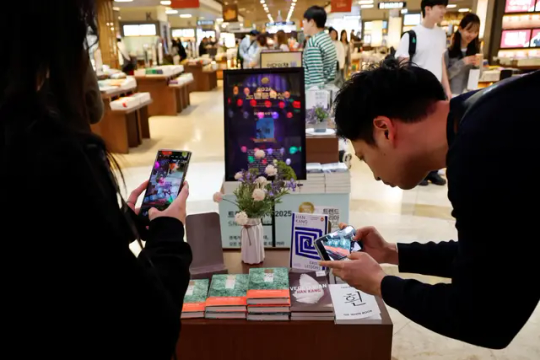
Han Kang’s books sell out as South Korea celebrates her Nobel prize in literature
Nine of the Top 10 bestsellers in Korea’s largest bookstore chain are works by Han with her win being honoured by politicians, authors, readers and the entire country
Queues of customers spilled out of South Korea’s bookshops yesterday and online stores crashed as readers tried to get their hands on the work of the new Nobel prize winner, Han Kang.
The country’s largest book chain, Kyobo Book Centre, said sales of Han’s books boomed on Friday, with stocks selling out almost straight away, reported Reuters.
South Korean politicians, authors and readers celebrated her win. President Yoon Suk Yeol congratulated her in a Facebook post, and in parliament multiple government hearings were paused as officials cheered the news.
“I was very surprised when I was first told the news of the award. When the phone call ended, I slowly regained my sense of reality and started to feel emotional,” Han said. “Thank you very much for selecting me as the winner. The huge waves of warm congratulations that were delivered to me throughout the day were also surprising. From the bottom of my heart, thank you.”
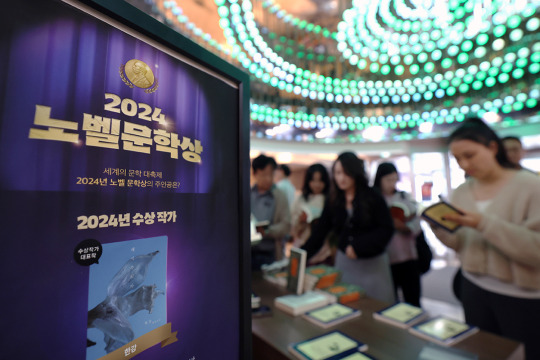
“Han Kang is a brilliant novelist who reflects our modern condition with courage, imagination, and intelligence,” said the Korean-American author of Pachinko, Min Jin Lee. “She is most worthy of this global recognition.”
Han became the first South Korean to win the Nobel prize in literature yesterday. “If one Korean novelist must win the Nobel prize in literature, it would have to be Han Kang,” said South Korean author Sung-il Kim.
Nine of the Top 10 bestsellers listed on the Kyobo site are Han’s works. The top seller, The Vegetarian – her 2007 novel which was translated into English in 2015 by Deborah Smith and subsequently won the International Booker – has climbed more than 350 places.
“We cheer and rejoice,” said South Korean author Kim Bo-young. “I am even prouder and happier that this winning of the prize directly refutes the foolishness of trying to hide and distort Korea’s past history.”
Han’s works often address historical traumas. Her 2014 novel, Human Acts, is about the May 1980 Gwangju uprising, while her 2021 novel – to be published in English with the title We Do Not Part in February next year – looks at the 1948-49 Jeju uprising.
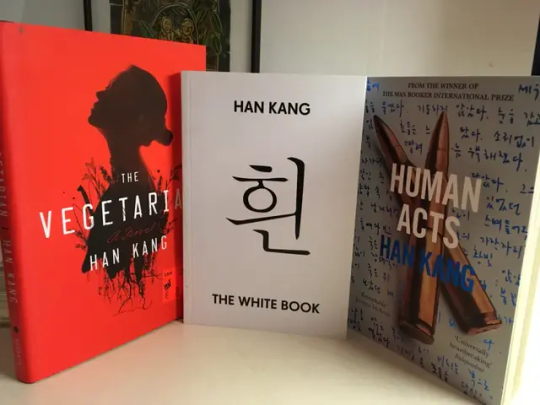
“As soon as I heard the news of Han Kang’s Nobel prize win, I thought of her dedication to writing novels that address marginalised and discriminated groups,” said South Korean author Jeon Heyjin. “The next thought was that Han Kang is from the Honam region, like Kim Dae-jung.” Kim was the president of South Korea between 1998 and 2003, and received the Nobel peace prize in 2000.
“The Honam region and Gwangju have both suffered from discrimination and prejudice, endured the atrocities of dictatorship, and played an important historical role in sustaining democracy in Korea during harsh times,” she added. “I believe that, like Kim Dae-jung, Han Kang also represents the pain and discrimination of modern Korean history through her work while demonstrating the courage for all of us to move toward a better future.”
Han’s father said that the new laureate may decide to avoid the limelight, according to Reuters. “She said given the fierce Russia-Ukraine, Israel-Palestine wars and people dying every day, how could she celebrate and hold a joyous press conference?”
He said that Han received the news of her win about 10 to 15 minutes before the rest of the world found out. She was so surprised by it that she at one point thought it might be a scam.
Daily inspiration. Discover more photos at Just for Books…?
7 notes
·
View notes